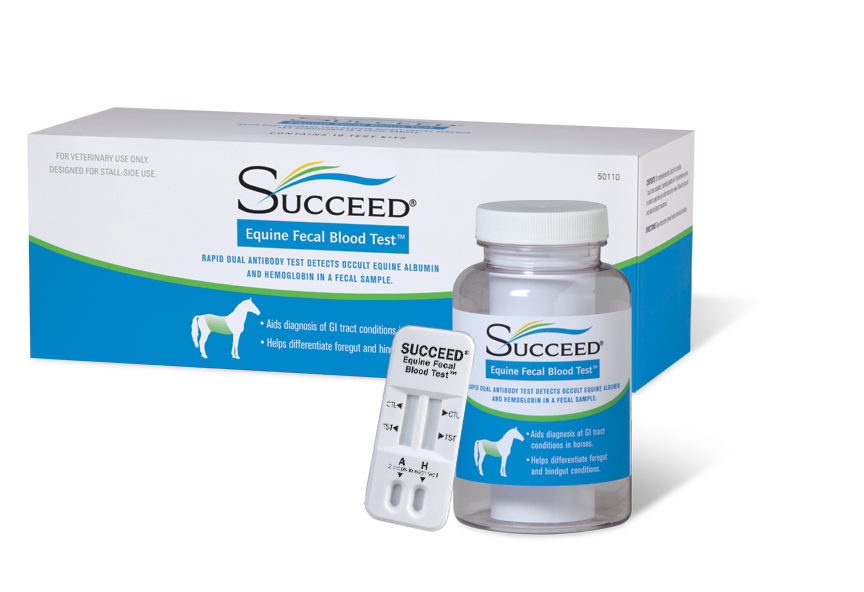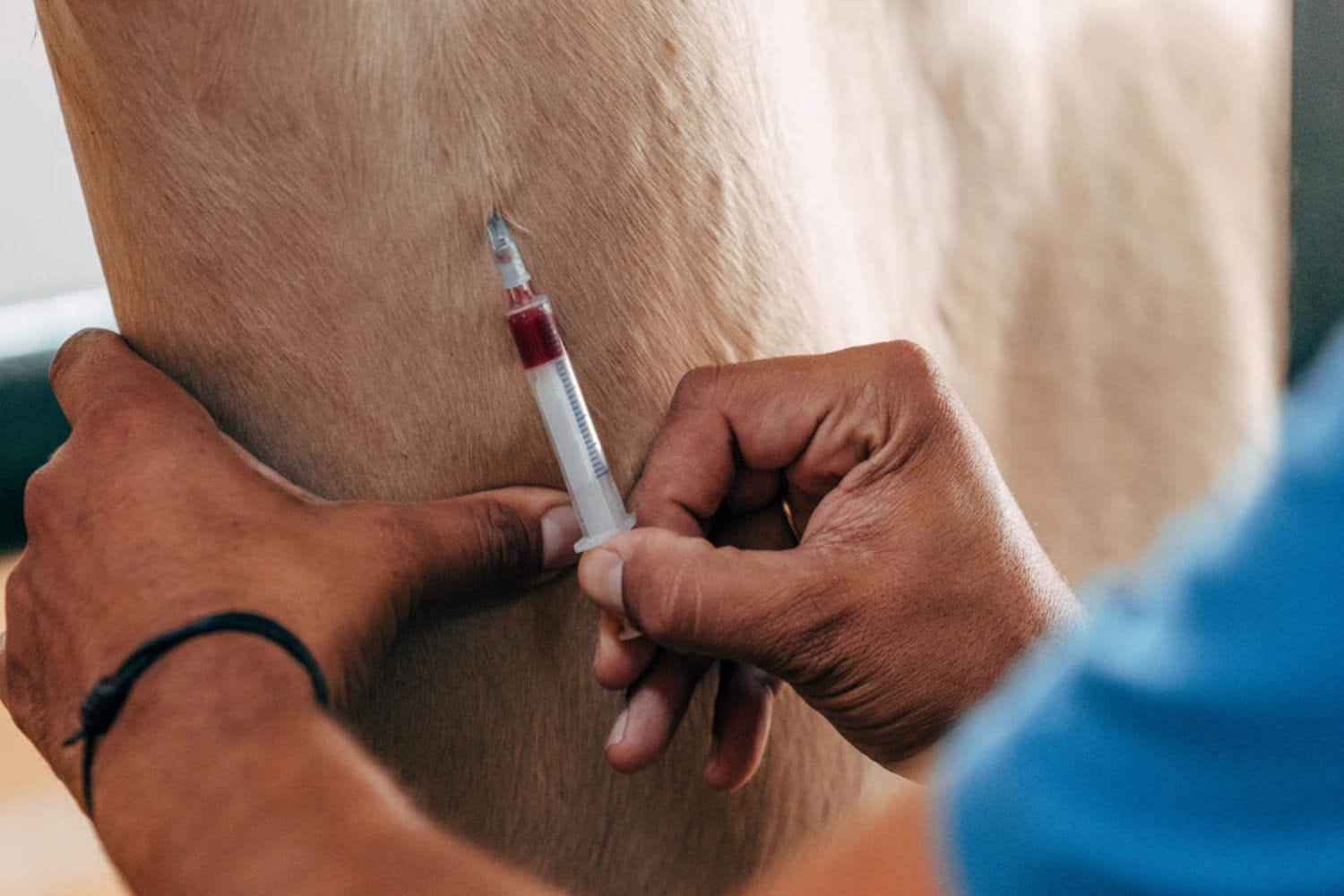As a horse owner, our equine partner’s comfort and health is our top concern. We all know the old adage, “no hoof, no horse”, but the same could be said about a horse’s GI tract. Its digestive health is just as important for performance, function and comfort. The results of your horses’ blood work, depending on which tests were ordered by your vet, can indicate the presence of disease, quality of digestion, and even how well their immune system and metabolism are functioning.
Let’s take a look at what you can glean from various blood and biochemical tests about your horse’s health.
Types of Blood Tests for Your Horse
Most lab work is done by looking at a horse’s blood sample. There are a variety of different blood tests that measure specific levels of microscopic cells and compounds.
It’s important for owners to understand that different labs use different systems for performing tests, so what is “normal” or “high” or “low” on these blood tests can vary based on the lab your vet uses. For that reason, your vet will need to interpret the results and evaluate what represents a normal versus a concerning value in your horse. Don’t stress over what a Google search tells you may be high or low; work with your vet to understand what your horse’s results may indicate.
Here are the various tests you will see on your horse’s blood report and generally what abnormal results can mean.
Complete Blood Count
A complete blood count test, or CBC, is used to look specifically at red blood cell and white blood cell counts. High or low levels of certain components can indicate specific causes or concerns that your vet may need to address quickly.
Red Blood Cells
A “RBC count” on your horse’s bloodwork stands for red blood cell counts. Three components are measured here: red blood cells, hemoglobin, and hematocrit. Low values for any of these three indicate anemia, which could be caused by numerous conditions. High values may indicate dehydration or stress.
White Blood Cells
White blood cells (WBCs) are a better indicator of disease or inflammation than red blood cells, as they provide a window into your horses’ immune function. A lower than normal WBC value is what happens when the body has already fought the infection but hasn’t had time yet to rebound. Here are the specific breakdowns of a WBC count and what high levels can mean:
- Neutrophils: bacterial infection.
- Monocytes: long-term inflammation.
- Eosinophils: allergic reaction or parasitic infection.
- Basophils: allergic reaction.
- Lymphocytes: stress inducted inflammation or viral infection.
Biochemical Tests in Horse’s Blood Work
Common biochemical compounds that your vet may test for can indicate specific dysfunctions or diseases, especially when it comes to your horse’s gi tract health.
Adrenocorticotropic hormone (ACTH)
ACTH is a hormone produced by the pituitary gland in response to stress and has a feedback loop in response to cortisol. Elevated ACTH is a primary indication of Cushing’s disease, which is caused by pituitary gland enlargement.
Alkaline Phosphatase (ALP)
ALP reference ranges vary widely depending on a horse’s age, but elevated levels can indicate intestinal dysfunction, chronic liver disease, or bone metabolism. Sometimes acute liver damage can heal, however other concerns with elevated ALP and other liver enzymes can be exposure to toxins, bile stones or toxic plant ingestion.
Cortisol
A hormone produced by the adrenal glands in response to ACTH levels in the body, elevated levels of cortisol are also present in horses with Cushing’s disease (PPID) or equine metabolic syndrome.
Glucose
Glucose is often measured in horses with suspected or confirmed equine metabolic syndrome or Cushing’s disease (PPID), and indicates the level of small intestine function as well.
Insulin
Insulin levels are commonly included in PPID tests and are another indicator of metabolic function. PPID and equine obesity often leads to insulin resistance and elevated blood insulin levels. Elevated insulin levels also can indicate an increased risk of laminitis and founder if not treated.
Lactate
Lactate can be measured through blood concentrations or through other fluids. Comparing blood and fluid lactate levels can help veterinarians tell the difference between different types of colic or some types of bacterial infection. Often, lactate levels that are on the rise in a horse that’s colicing predict worse outcomes.
Lactate Dehydrogenase (LDH)
LDH is in many different tissues in our horses. In order for our veterinarians to better understand what disease may be an issue, the LDH levels have to be further broken down into isoenzymes. These isoenzymes can indicate liver, muscle or intestinal conditions.
Total Protein (TP)
Total protein gives a big picture look into different proteins present in the blood that contribute to volume, and can indicate the following based on which proteins may be high or low:
- Albumin: Elevated levels indicate dehydration, whereas low levels indicate protein loss through the intestines or kidneys, or due to liver disease.
- Globulin: This protein assists the horses’ immune system. Elevated levels are seen when an infection is present and can indicate a need for more in-depth testing.
- Inflammatory proteins: Common inflammatory proteins that are measured include serum amyloid A (SAA) and fibrinogen. Elevated fibrinogen indicates tissue damage and rises slower than SAA, which rises in response to an infection or inflammatory response.
- Triglycerides: These proteins transport fat in the body and can indicate metabolic state. These are often seen in high levels when horses begin eating the right amount of food after a period of famine. If triglycerides are too high in healthy horses, it can cause negative effects for their liver, kidneys and metabolic function.

What’s Next After Blood Work?
It’s quite empowering to be able to understand the results of our horses’ blood work so we can help keep them happy, healthy and comfortable.
The following elevated levels could indicate significant digestion issues that are worth exploring further:
- Elevated ACTH, cortisol or insulin
- Elevated total protein
- Elevated LDH or lactate
- Elevated WBC, especially eosinophils and basophils
Your vet will direct additional diagnostics based on your horse’s blood work results, symptoms, and history.
SUCCEED Equine Fecal Blood Test (FBT)
Fecal blood testing is an accurate, non-invasive way to further guide veterinarians with their diagnostic journey for our equine partners. SUCCEED Equine Fecal Blood Test (FBT) is a stall-side diagnostic aid that can indicate the presence of GI injury including, but not limited to, stomach and colonic ulcers.
How it Works
SUCCEED FBT tests for components of a horse’s blood, albumin and hemoglobin, in a fresh manure sample using an equine-specific antibody test (like a pregnancy or Covid test). A positive result for albumin only indicates hind gut injury, while a positive result for hemoglobin indicates active bleeding somewhere in the digestive tract. Taken together, these results can identify if your horse has a problem in its digestive tract and help determine if it’s in the stomach, hindgut, or both.

How Does This Help My Vet?
Results from a SUCCEED FBT can help guide your veterinarian in a more confident direction to help get a diagnosis and treatment plan on board for your horse. Accurate, timely treatments lead to more targeted treatments and better outcomes for your horse, and more peace of mind for us as their humans.
Ask your Vet to Test with SUCCEED FBT
Ask your veterinarian to test with SUCCEED FBT if you suspect digestive issues with your horse, or simply want to be proactive in monitoring your horse’s gi tract health.. You or your vet can access more information on the SUCCEED FBT website.




